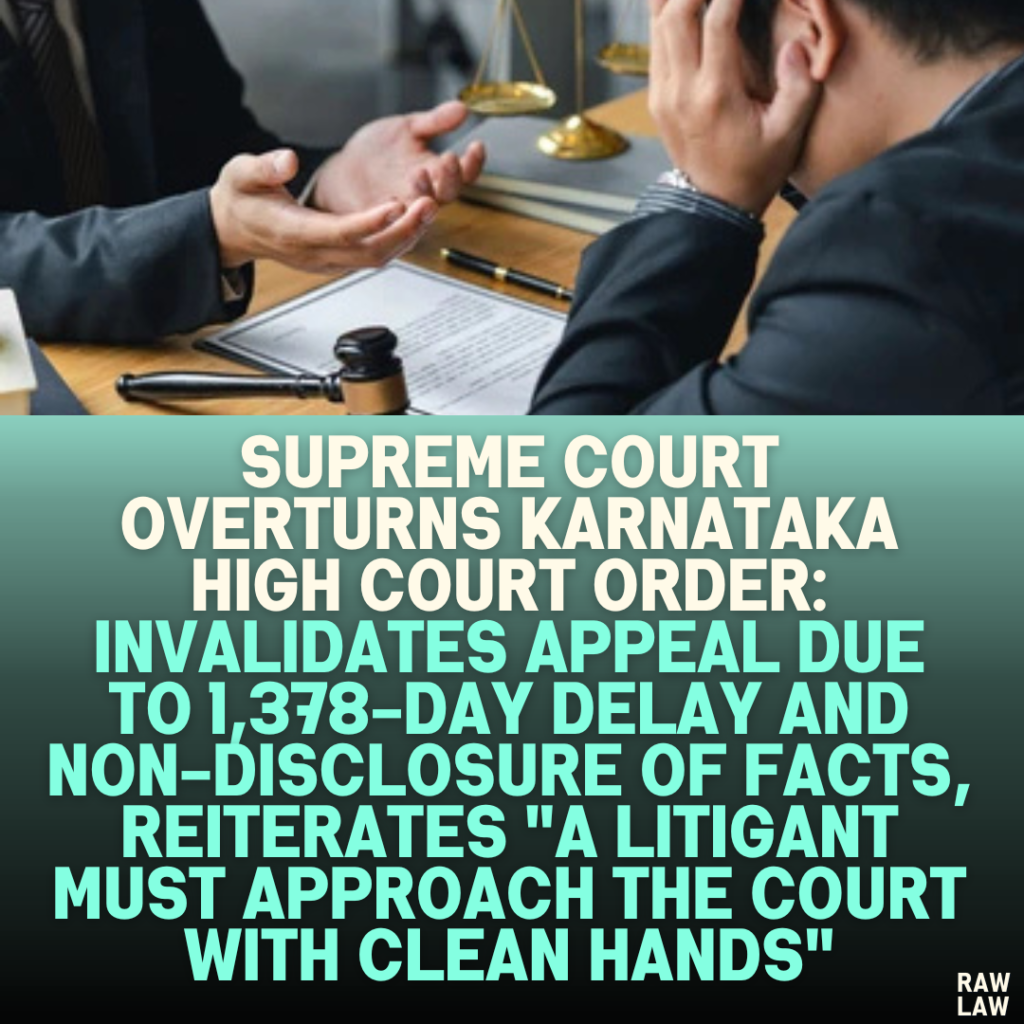Court’s Decision
The Supreme Court overturned the Karnataka High Court’s orders in several writ appeals, reinstating the judgments passed by the single judge. It emphasized that the respondent’s failure to disclose material facts, coupled with unjustified delay in filing the appeals, compromised the judicial process. The Court allowed the appeals filed by the appellant, a company that purchased the disputed property, and set aside all adverse findings against it.
Facts of the Case
- Ownership of the Property:
- The appellant, a wholly-owned subsidiary of Maxim Integrated Products, USA, purchased a property (Survey No. 49/43A) in Bangalore from one Mr. Basant Kumar Patil, who acquired it through lawful proceedings, including a mutation in his favor.
- The appellant contended that the ownership and legal proceedings regarding the property had been conclusively settled.
- Claims by Respondent:
- The respondent filed for tenancy rights under the Karnataka Land Reforms Act, 1961, in LRF No. 835/74-75. This claim was dismissed in 1981 and had attained finality.
- Despite this, the respondent continued to pursue claims over the property, filing writ appeals challenging favorable orders for the appellant’s vendor.
- Delay and Non-Disclosure:
- One of the appeals filed by the respondent had a delay of 1,378 days, which was condoned by the High Court. However, the appellant was not given an opportunity to contest the appeal’s merits.
- The respondent failed to disclose crucial adverse orders, including the rejection of their earlier tenancy claims and the finality of related proceedings.
- High Court Proceedings:
- The High Court allowed the respondent’s appeal and passed adverse orders against the appellant, leading to the current appeals before the Supreme Court.
Issues
- Delay in Filing Appeals:
- Whether the High Court was justified in condoning an inordinate delay of 1,378 days without adequate cause.
- Whether such condonation undermined the legal process and prejudiced the appellant.
- Non-Disclosure of Facts:
- Whether the respondent’s failure to disclose previous adverse orders amounted to suppression of material facts.
- Whether such suppression invalidated the relief granted by the High Court.
Petitioner’s (Appellant’s) Arguments
- Finality of Earlier Proceedings:
- The proceedings under LRF No. 835/74-75, where the respondent claimed tenancy rights, had been conclusively decided against them in 1981. There was no basis for their continued litigation.
- The respondent’s claims were baseless and relied on manipulated facts.
- Prejudice Due to Delay:
- The condonation of the delay without justification prejudiced the appellant, as it had lawfully acquired the property and was entitled to a quiet title.
- Non-Disclosure:
- The respondent deliberately suppressed orders from earlier proceedings that were unfavorable to them.
- Such non-disclosure constituted an abuse of the judicial process.
Respondent’s Arguments
- Delay Justified:
- The delay was due to procedural challenges and was necessary to ensure justice.
- Merits of Claim:
- The respondent contended that their claim to tenancy rights and the land’s status as Inam land were still valid.
- Effect of Earlier Decisions:
- The respondent argued that earlier decisions were inconsequential to the present case due to pending appeals.
Analysis of the Law
- Condonation of Delay:
- The Court held that condoning delays without sufficient cause undermines the finality of decisions and prejudices lawful owners.
- The delay of 1,378 days was deemed excessive and unjustified, especially when the appellant was not allowed to contest on merits.
- Duty of Disclosure:
- Relying on Ramjas Foundation v. Union of India [(2010) 14 SCC 38], the Court reiterated that litigants must approach courts with clean hands. Non-disclosure of critical facts disentitles a party from relief.
- Manipulation of Facts:
- The respondent attempted to manipulate facts by changing names and presenting contradictory claims. The Court found this to be a deliberate misuse of the judicial process.
Precedent Analysis
- Ramjas Foundation v. Union of India:
- This case established that litigants who suppress material facts are not entitled to relief from the courts.
- The Supreme Court applied this principle to reject the respondent’s claims.
Court’s Reasoning
- Delay and Prejudice:
- The delay condoned by the High Court unfairly prejudiced the appellant, who had acted lawfully based on earlier decisions.
- Non-Disclosure and Bad Faith:
- The respondent’s deliberate non-disclosure of earlier adverse orders showed bad faith.
- Suppression of facts was fatal to their claims.
- Abuse of Process:
- The respondent abused the judicial process by filing repeated claims and appeals based on manipulated and false grounds.
Conclusion
The Supreme Court allowed the appeals and:
- Restored the judgments of the single judge, which favored the appellant.
- Set aside the High Court’s orders in the writ appeals filed by the respondent.
Implications
- Strengthening Finality in Litigation:
- The decision underscores the importance of respecting the finality of judicial decisions.
- Deterrence Against Abuse:
- Litigants who manipulate facts or delay proceedings unjustifiably may face strict consequences.
- Duty of Candor:
- The ruling reinforces the principle that parties must disclose all material facts in judicial proceedings.



